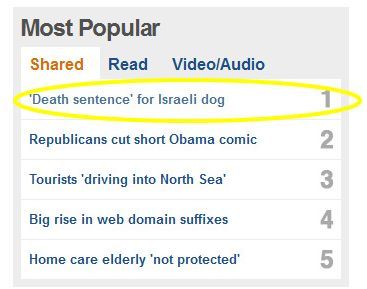UPDATE: Hours after publishing this critique, the BBC published a separate followup reflecting Maariv’s apology, while the Daily Telegraph removed the story from its website.
We wait for AFP and YNet News to correct the record as well.
UPDATE 2: The BBC’s response is simply unacceptable. Find out why here on our Backspin blog and take further action.
UPDATE 3: AFP have made a bad situation even worse by using an illustrative photo of a dog near the Israel-Gaza border to create a subliminal association between the dog story and the Israeli-Palestinian conflict.
Find out more here and take further action.
* * *
A truly bizarre story appeared in the Israeli press in the past few weeks. According to YNet News:
A Jerusalem rabbinical court recently sentenced a wandering dog to death by stoning. The cruel sentence stemmed from the suspicion that the hound was the reincarnation of a famous secular lawyer, who insulted the court’s judges 20 years ago.
The story was picked up by the Daily Telegraph, Time, AFP and the BBC, where it is currently the most shared item on the entire News website.
However, it turns out that the outlandish story is precisely that – a story. Israeli newspaper Ma’ariv published an apology (translated from Hebrew below) in its June 15 edition after it was revealed that the only accurate detail was a dog running loose in a court building causing something of a commotion:
On the 3rd of June 2011 we published a story titled “Mea Shearim: Rabbinnical court orders the stoning of a dog”. The story reported a police complaint filed by the Association for Animal Rights (Tza’ar Ba’alei Chaim) against the Jerusalem Rabbinnical Court for Financial Affairs. The story also featured the total denial of the Chief Justice of the court, Yehoshua Levin, of the complaint. The Rabbi said, among other things: “There is no basis for the abuse of an animal, neither from the Halacha nor by common sense”. According to him, employees of the municipality have collected the dog from the court. The title of the story didn’t fully present the entire story, and we apologize for the anguish caused to the court and its members.
Shame on the Israeli press for publishing the story in the first place, which could be chalked down to internal Israeli issues between secular and ultra-Orthodox sectors of the population.
Indeed, the Israeli press like any free media in the developed world is more than capable of tabloid-style journalism, displaying political bias and making mistakes. The Israeli press, however, has a responsibility beyond that to its own domestic audience.
So many of the stories that you see in the international media are not exclusives broken by the New York Times, CNN or The Guardian. They come straight from the pages of the Hebrew press. And foreign journalists don’t even need to read Hebrew thanks to the proliferation of Israeli news sites in English, such as Ha’aretz, YNet News and the Jerusalem Post.

Perhaps the Daily Telegraph, Time, AFP and the BBC can be forgiven for running a story that was newsworthy simply due to its highly unusual nature. Making #1 on the BBC’s Most Shared list is testament to the interest that it generated.
But it doesn’t change the fact that even during relatively “quiet” periods in Israel and particularly when the main news stories are coming from neighboring countries such as Syria, some media are still compelled to publish stories that are not only negative but actually demeaning to Israel or the Jewish religion.
In any case, international media outlets should do the professional thing and follow the Israeli press in publishing corrections.
Time has published the following update:
According to Hebrew news sources, the story originally published in the Behadrei Haredim newspaper may not have been based on factual reporting. The court denies the sentence was ever handed down, claiming the only action taken against the dog was in calling animal control officials to remove the dog.
Please write to the Daily Telegraph informing it of the error through its Contact Us Form, to the AFP through its Facebook page and to the BBC through its Feedback form remembering to supply the relevant story hyperlinks:
– http://www.telegraph.co.uk/news/worldnews/middleeast/israel/8583317/Jewish-court-sentences-dog-to-death-by-stoning.html
– http://www.bbc.co.uk/news/world-middle-east-13819764
– http://tinyurl.com/afpdog


